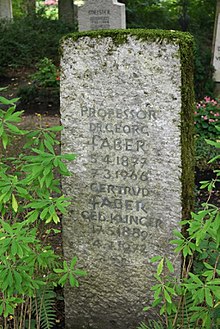Georg Faber (mathematician)
Georg Faber (born April 5, 1877 in Kaiserslautern , † March 7, 1966 in Munich ) was a German mathematician .
Live and act
Faber studied mathematics and physics from 1896 to 1901 at the Ludwig Maximilians University in Munich and the Georg August University in Göttingen . With a thesis on series developments of analytical functions , he was awarded a Dr. phil. PhD . In 1905 he completed his habilitation at the Julius Maximilians University of Würzburg with a paper on power series of several variables.
Faber worked as a full professor of mathematics at the Eberhard-Karls-Universität Tübingen (1909–1910), the TH Stuttgart (1910–1912), the Albertus University Königsberg (1912–1913), the Kaiser-Wilhelms-Universität Strasbourg (1913 –1916) and the TH Munich (1916–1946).
His scientific importance lies primarily in his ideas about the polynomial expansion of analytical functions in an area bounded by a smooth curve. These polynomials are determined by the area alone and are called Faber polynomials . Most of Faber's works belong to function theory (complex analysis).
In 1923 he and Edgar Krahn independently proved the Rayleigh-Krahn-Faber inequalities in the two-dimensional case.
He published the collected works of Elwin Bruno Christoffel and the volumes 14-16 of the works of Leonhard Euler . During his time in Munich, he played a major role in the mathematical training of engineers, physicists and mathematicians.
At the end of the war in 1945, the military government appointed him rector of the technical university. As such, he endeavored to resume the lectures that took place in the summer semester of 1946. He then retired, but continued to actively participate in the mathematical life of the TH Munich.
Honors
- 1921: Full member of the mathematical and natural science class of the Bavarian Academy of Sciences
- 1956: Large Federal Cross of Merit
- 1959: Bavarian Order of Merit
Web links
- Literature by and about Georg Faber in the catalog of the German National Library
- John J. O'Connor, Edmund F. Robertson : Georg Faber (mathematician). In: MacTutor History of Mathematics archive .
- Georg Faber in the Mathematics Genealogy Project (English)
Individual evidence
- ↑ Information from the Federal President's Office
| personal data | |
|---|---|
| SURNAME | Faber, Georg |
| BRIEF DESCRIPTION | German mathematician |
| DATE OF BIRTH | April 5, 1877 |
| PLACE OF BIRTH | Kaiserslautern |
| DATE OF DEATH | March 7, 1966 |
| Place of death | Munich |

